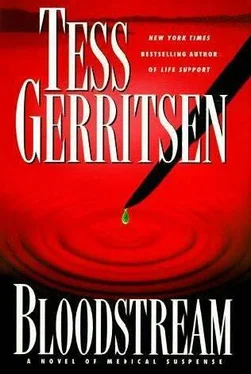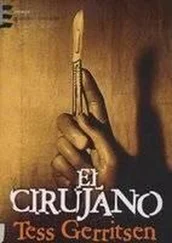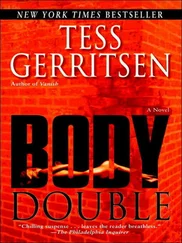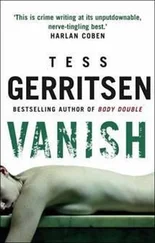“I heard there was a hatchet mark on one of the thigh bones.”
“That’s true.”
“It will have people wondering. Remembering.”
Lincoln heard the woman’s fear, and he wanted to reassure her, but could not bring himself to make physical contact. Iris Keating was not a touchable woman.
Her emotional barrier was so thick, it would not have surprised him to reach out and feel a shell.
He said, “It was a long time ago. No one remembers.”
“This town remembers.“
“Only a few. The older ones. And they don’t want to talk about it any more than you do.”
“Still, it’s a matter of public record. And now all those reporters are in town.
They’ll be asking questions.”
“What happened half a century ago isn’t relevant.”
“Isn’t it?” She looked at him. “This is how it began last time. The killings. It started in the fall.”
“You can’t interpret every violent act as history repeating itself.”
“But history is violence.” Once again, she faced forward, her gaze directed toward the lake. Night had fallen and through the bare trees, the water was only a faint glimmer. “Don’t you feel it, Lincoln?” she asked softly. “There’s something wrong about this place. I don’t know What it is, but I’ve felt it since I was small. I didn’t like living here, even then. And now…“ She reached for the ignition and started the engine.
Lincoln stepped out of the car. “It’s a slippery road tonight. Drive carefully.”
“I will. Oh, and Lincoln?”
“Yes?”
“I’m told there’s a new opening in that alcohol rehab program in Augusta. It might be the place for Doreen. If you can talk her into it.”
“I’ll try. I just keep hoping that one of these days it’ll take.”
He thought he saw pity in her eyes. “I wish you luck. You deserve a lot better, Lincoln.”
“I’m managing all right.”
“Of course you are.” He realized, then, that it wasn’t pity, but admiration he heard in her voice. “You’re one of the few men in this world who would.”
A photo of Mrs. Horatio was propped up on the coffin, a picture of her as a young woman of eighteen, smiling, almost pretty. Noah had never thought of his biology teacher as pretty, nor had he imagined her as ever having been young. In his mind, Dorothy Horatio had sprung up on this earth already middle-aged, and now, in death, she would remain eternally so.
Moving with the long line of students, he shuffled dutifully toward the coffin, past the photo of Mrs. Horatio in her past incarnation as an actual human female. It was a shock to confront that eerily familiar image of Mrs. Horatio before the extra pounds and wrinkles and gray hair. To realize that the photo had been taken when she was not much older than Noah. What happens when we get old? he wondered. Where does the kid part of us go?
He stopped before the coffin. It was closed, which was a mercy; he didn’t think he could handle seeing his dead teacher’s face. It was terrible enough just to imagine how she must look, hidden beneath that mahogany lid. He had not particularly liked Dorothy Horatio. Not at all, in fact. But today he had met her husband and adult daughter, had seen them both sobbing, their arms flung around each other, and had come to realize a startling truth: that even the Mrs. Horatios of this world have people who love them.
In the coffin’s polished surface, he could see his own face, bland and composed.
Emotions hidden beneath an expressionless mask.
He had not been so composed at the last funeral he’d attended.
Two years ago, he and his mother had stood holding hands as they gazed at his father’s coffin. The lid had been left open, so people could gaze down at his gaunt face as they said their good-byes. When the time had come to leave, Noah had refused to go. His mother had tried to lead him away, but he had sobbed: You can’t leave Daddy in there! Go back, go back!
He blinked and touched his hand to Mrs. Horatio’s coffin. It was smooth and glossy. Like fine furniture.
Where does the kid part of us go?
He realized that the line ahead of him had vanished, that people behind him were waiting for him to move forward. He continued past the coffin, walked up the aisle, and fled out the mortuary doors.
Outside it was lightly snowing, the cold kiss of flakes soothing to his face. He was relieved none of the reporters had followed him out. All afternoon, they’d chased him around with their tape recorders, wanting just a sentence from the boy who’d courageously wrestled the gun away from the killer. The hero of Knox High School.
What a joke.
He stood across the Street from the mortuary, shivering in the gloom as he watched people walk out of the building. They each performed the identical into-the-cold ritual: the appraising glance at the sky, the shudder, the hugging close of one’s coat. Just about everyone in town had come to pay their last respects, but he scarcely recognized some of them, so transformed were they by their suits and ties and mourning dresses. No one wearing the usual flannels and jeans. Even Chief Kelly was wearing a suit and tie.
Noah watched as Amelia Reid stepped out the mortuary doors. She Was breathing quickly, deeply, and she sagged against the building as though she’d been pursued and was desperately trying to catch her breath.
A car drove by, its tires crunching across the crystalline snow as it passed between them.
Noah called out to her: “Amelia?”
She looked up, startled, and saw him. She hesitated, glancing up and down the street, as though to assure herself it was safe to proceed. He felt his heart beat faster as she crossed the street to join him.
“Pretty grim in there,” he said.
She nodded. “I couldn’t listen to it anymore. I didn’t want to start crying in front of everyone.”
Neither did I, he thought, but would never admit it.
They stood together in the gloom, not looking at each other, both of them moving their feet to stay warm. Both of them searching for some thread of conversation.
He took a deep breath and said, suddenly, “I hate funerals. They remind me of…
.“ He stopped.
“They remind me of my dad’s funeral, too,” she said softly. And she looked up as snowflakes spiraled down from the darkening sky.
Warren Emerson walked on the side of the road, his boots crunching the frost-stiffened grass. He wore a blaze-orange vest and an orange cap, yet he couldn’t help flinching every time another gun went off in the woods. Bullets, after all, were colorblind. It was cold this morning, far colder than yesterday, and his fingers ached in their thin woolen gloves. He shoved his hands into his pockets and kept trudging, not worried about the cold, knowing that in another mile he would cease to notice it.
He had walked this road over a thousand times, in every season of the year, and could trace his progress by the landmarks he passed. The toppled stone wall was four hundred paces from his front yard. The Murray's’ tumbledown barn was nine hundred fifty paces. At two thousand paces, the turnoff to Toddy Point Road, he reached the halfway mark. The landmarks became more frequent as he approached the outskirts of town. So did the traffic, every so often a car or truck rattling by, tires spitting up dirt.
Local drivers seldom stopped to offer Warren a ride into town. In the summertime he caught plenty of rides, from tourists who considered Warren Emerson, shuffling along in his boots and baggy trousers, an example of living, breathing local color. They’d pull over and invite him to climb in for a lift. During the drive they’d ply him with an endless stream of questions, always the same ones: “What do you folks do in the winter?” “You lived here all your life?” “You ever met Stephen King?” Warren’s answers never went beyond a simple yes or no, an economy of words which the tourists invariably found amusing. They’d pull into town, let him off at the general store, and wave so sincerely you’d think they were saying good-bye to their best friend. Wicked friendly people, those tourists; every autumn, he was sorry to see them go, because it meant another nine months of walking down this road, with not a single driver who’d stop for him.
Читать дальше
Конец ознакомительного отрывка
Купить книгу












